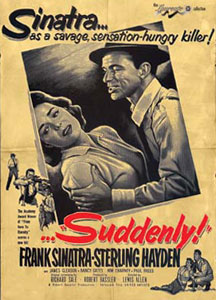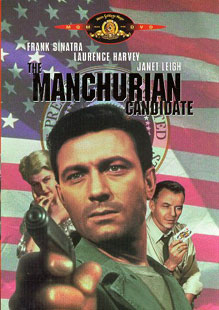 I first saw The Manchurian Candidate (1962) as a kid of fifteen, when it aired on television. It scared the bejabbers out of me, as I was naive enough to believe in brainwashing of the sort depicted, & I had earllier been "primed" at age six & seven when the littlest school children were taught to "duck & cover" during the inevitable nuclear holocaust to be rained down upon us by evil communists.
I first saw The Manchurian Candidate (1962) as a kid of fifteen, when it aired on television. It scared the bejabbers out of me, as I was naive enough to believe in brainwashing of the sort depicted, & I had earllier been "primed" at age six & seven when the littlest school children were taught to "duck & cover" during the inevitable nuclear holocaust to be rained down upon us by evil communists.
I saw this cold war classic anew in 1988 when it made the rounds to arthouse cinemas nationwide, including for Seattle's in-those-days extensive classic cinema interests. Surprisingly it had a lot more to it than Cold War scare tactics.
It held up so damned well, despite that so many of its premises were so gravely reliant on the worst propogandistic hatemongering America could drum up against the alien "other," the bug-a-boo Communism which in this film has the face of Asia all over it. It has since, with each viewing, becoming increasingly easy to deconstruct into appalling parts, & yet the power of the thing is undeniable.
It is, as a whole, a mighty film that uses its symbolic & mythic underpinnings, & its fine acting, to cast a shadow of horror over its viewer. Frankenheimer's direction can make a close-up of the Queen of Diamonds seem like a thing of abject fear, & that's quite a filmic achievement in itself. I sometimes think it should be categorized as a horror film rather than a political thriller.
Even it's bitterly "happy" ending is really only born of a deep abiding misogyny in American culture that makes the worst thing you can think up against your own mother absolutely true. Spiritually it's a disgusting film. But horror, even political horror, is not going to be such a thrill if the point were to be uplifting.
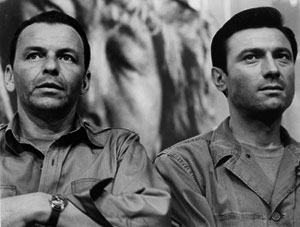 My step-mom was Southeast Asian, but it never occurred to me as a kid that this Red Scare & Yellow Peril fable was racist, though it certainly was. As an adult, of course, it is hard to form apologetics in its favor without embarrassment. My step-mom was Southeast Asian, but it never occurred to me as a kid that this Red Scare & Yellow Peril fable was racist, though it certainly was. As an adult, of course, it is hard to form apologetics in its favor without embarrassment.
Henry Silva as Chinchun was especially agregious, cast as an Asian houseboy which would've been an obnoxious stereotype even if he were played by someone Asian & hadn't been so creepy. As it stood he was the equivalent of a white man in black face playing a "real" negro. Make him evil incarnate while you're at it, & hey, is Hollywood racist or what?
The "friendly" face of Khigh Dhiegh orchestrating the mind-wipes of wholesome American soldiers in flashback scenes was indeed like something from a Universal horror film. And I loved Universal monsters, so on that first viewing when I was fifteen, I didn't think "how offensive is that" but only "oh! oh! how cool is he!" Khigh's Dr. Yen Lo was, like King Kong or the Frankenstein monster, a loveable guy -- to an enthusiastic horror fan at least.
I was in fact a devoted fan of Khigh Dhiegh, loved him & his hat in Goldfinger (1964). Even when old enough to realize how harmful Yellow Peril crap could be, I could not help but hold in high regard regard his performance on episodes of Hawaii Five O as Wo Fat, one of the greatest villain creations of all time. Wo Fat was a guy you really did not want captured or killed because you wanted him to live to try to dominate the world another time!
Khigh certainly seemed to have a Chinese face & was so cast in all his roles. In reality he was Egyptian-Sudanese-English. But he was also one of the foremost spokesmen & teachers of Taoism, so it seemed kind of fated he looked like one of the Lucky Gods.
As a kid I did sometimes wonder why he wasn't the hero of the tale instead of always the villain, as my own mixed-race family permitted me to instinctively view that face as heroic. To this day, villains or enthnic sidekicks so often seem like they should've played the lead, swap them around to let the nambypamby pretty-boy honky lead play the villain or the comic relief bafoon.
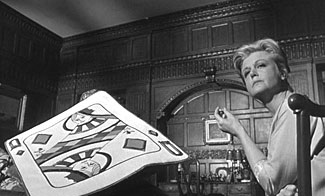 So far scarier than those manipulative evil commy Asians was Angela Lansbury as the brainwashed assassin's mother. She, not Khigh Dhiegh, gave me nightmares. So far scarier than those manipulative evil commy Asians was Angela Lansbury as the brainwashed assassin's mother. She, not Khigh Dhiegh, gave me nightmares.
If the Cold War mythology of Red Threat & Yellow Peril had been the height of the film's significance, it wouldn't be the classic it clearly is. It's that tragic performance by Laurence Harvey as Everyman, the good soldier, broken by fear, haunted, re-programmed to do the evil of others, whose path of doom is one even his mother insists he tread.
And then there's that calmly tense investigation launched by his fellow soldier, played by Frank Sinatra with such concerned anguish, struggling with the same nightmares of their submerged experience, & only vaguely certain his "war-hero" buddy has to stopped.
The deep sense of paranoia in the film relies on the unlikeliest of conspiracy premises, but who doesn't love a good conspiracy theory. And in a powerful way, Manchurian Candidate perfectly captures a mood, attitude, & belief system that had unfortunate currency in the '50s & '60s.
It's a film that could never be remade for another generation because no other generation is as emotionally connected to such hatemongering myths & fearful theories about slanty-eyed commies. And Denzel Washington proved it couldn't be remade by remaking it.
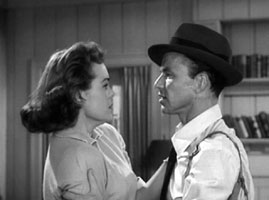 The little town of Suddenly (1954) was founded during the gold rush. It had been a rough & tumble sort of place back then, but nowadays the standard joke around town is it should be renamed Gradually. The little town of Suddenly (1954) was founded during the gold rush. It had been a rough & tumble sort of place back then, but nowadays the standard joke around town is it should be renamed Gradually.
Pidge (Kim Charney, a child actor mostly on '50s television shows, with no adult career) is a cute little boy whose dad died three years before in the war. Young windowed Ellen Benson (Nancy Gates) is being courted by the kindly sheriff Tod Shaw (Sterling Hayden), but Ellen can't put Pidge's dad behind her, can't fully respond to anyone new.
Tod & his quiet town have to deal with danger for the first time in many years, when words comes that the President ofd the United States is passing through town at five p.m. that very afternoon. It's a confidential stop, with secret service men arriving a few hours ahead of the president.
Pete "Pops" Benson (James Gleason) lives with his daughter & grandson. Rather begging belief in tidy coincidences, Pops is himself a retired Secret Service man.
Johnny Baron (Frank Sinatra) plays an FBI agent set up in the Benson house because it has a bird's eye view of the train station. But Johnny & his two henchmen are actually planning to assassinate the president. He's extravagantly villainous & Pops sets out foremost to protect his granson, secondarily to stop the crime.
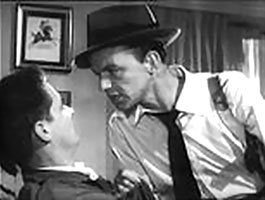 Sinatra's character is super-evil so no one doubts he'll kill Pidge if things don't go exactly as he demands. He may once have been a better man, a war hero in his day, but now psychotic, so that he even frightens his own hired thugs. Sinatra's character is super-evil so no one doubts he'll kill Pidge if things don't go exactly as he demands. He may once have been a better man, a war hero in his day, but now psychotic, so that he even frightens his own hired thugs.
Johnny was mustered out on a Section 8 & the one thing he hates most is to be called a loony. He begins to bond with the kid he'd just as soon kill. When Pidge scares the thugs with his cap gun, Johnny's amused. When Pidge finds his grampa's real gun, the thugs don't notice it's no longer the toy.
Film noir is so often urban, it is fascinating to see it pulled off this well in the bright sun of a rural California town. Suddenly builds to a rather startling climax, a journey which provided Sinatra with one of his best, & certainly his creepiest performances. The movie is not perfect, but Sinatra's performance is faultless, mesmerizing, & his willingness to become someone without redeeming characteristics indicates he did, for a whilte at least, seek to be a great actor.
Given Sinatra's trivial acting in stuff like Robin & the Seven Hoods () & Ocean's Eleven (), it's amazing to see him in Suddenly or The Manchurian Candidate & realize he did once upon a time take acting seriously, & could be extremely good.
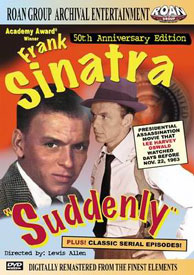 The Sinatra family must've occasionally felt there was some kind of conspiracy, what with the staying power of the rumor that Frank was personally buying up all copies either of The Manchurian Candidate or Suddenly, or both, doing everything he could to stop them from circulating, after the assassination of JFK. The Sinatra family must've occasionally felt there was some kind of conspiracy, what with the staying power of the rumor that Frank was personally buying up all copies either of The Manchurian Candidate or Suddenly, or both, doing everything he could to stop them from circulating, after the assassination of JFK.
A baseless myth spread, beginning 1986, by muckrakingly inept biographer Kitty Kelley was that Lee Harvey Oswald viewed Suddenly on television immediately before setting off to kill the president supposedly induced an ashamed Sinatra into withdrawing from circulation a film in which he played just such an assassin.
This legend was glommed onto by JFK Assassination Conspiracy fans as evidence that Frank had something to do with Jack Ruby killing Oswald, on the orders of Frank's friends in the mafia, avenging his pal the president.
Regional television programming is easily accessed for every year & hour in newspaper morgues. As a more credible biographer would easily have learned, Suddenly was not scheduled on any television station Oswald might've seen. So the entire story is just urban folklore.
Parts of the false but persisting rumors of Sinatra withdrawing the film from circulation were also attached to The Manchurian Candidate in which Sinatra plays the friend of the brainwashed assassin. It's the nature of urban folklore to shift just such ingredients.
These two cold war fables are part of the last wave of American film noir in their gloomy paranoia & atmospheric cinematography. With scripts & performances that embody a mythology of their own, it's not surprising they should be the focus of urban mythmaking.
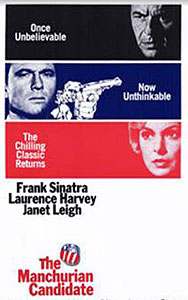 The truth is that Manchurian Candidate got a second wind after the JFK assassination & had a new theatrical release, with a new poster that read, "The Chilling Classic Returns!" Promoters alleged it had actually been a film JFK personally liked & praised. The truth is that Manchurian Candidate got a second wind after the JFK assassination & had a new theatrical release, with a new poster that read, "The Chilling Classic Returns!" Promoters alleged it had actually been a film JFK personally liked & praised.
It did better than it had on its first release. It then aired on television in 1965, & was regarded as a national event. I was a kid at the time but I remember the whole family gathering in front of an old Zenith black & white set, akin to families all across America.
Sinatra's own company was responsible for keeping the public aware of Manchurian Candidate in the period immediately after the assassination; & perhaps the Sinatra family prefers the myth that he withdrew it over the fact that his company took advantage of the JFK's death to make a few extra bucks off the film.
Suddenly on the other was not current enough to be given much regard either way. It had not done well in first release, & it was already an old film in days before the rise of revival film houses.
The urban legends surrounding these two films began in the late 1980s. In 1987 Manchurian Candidate got a new release, fresh prints for the art houses, & in 1988 it was for the first time available on video tape. It had been out of official circulation since 1972 because there'd been no viable market for it at that time, having run its course in the '60s, & having had a longer commercial life than most films ever have.
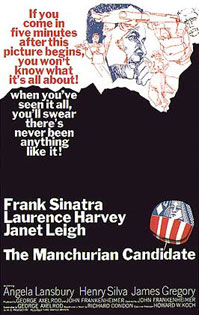 The scriptwriter for Candidate was George Axelrod. In a 1988 interview he claimed that many people attempted to squelch the film in 1964, when Sinatra's company was about to cash in on the JFK assassination with its theatrical re-release. The scriptwriter for Candidate was George Axelrod. In a 1988 interview he claimed that many people attempted to squelch the film in 1964, when Sinatra's company was about to cash in on the JFK assassination with its theatrical re-release.
But if Axelrod didn't make the whole story up, then the whiners & complainers he alludes to were just a few cranks on the phone, not anybody who could've induced any actual ban. The only place on earth that ever banned The Manchurian Candidate was Finland.
Suddenly, too, was re-released early in the video tape era, in a colorized version notorious for giving Sinatra brown eyes. It never made enough money for Sinatra's company to pay it much nevermind, & it was even permitted to fall out of copyright, meaning anyone anywhere at any time could distribute copies if they so desired.
The reality is that these films quite naturally fell from public interest for a while. This was because the black & white era was over; old movies didn't yet have the easy second breath they'd have when the video era was in full sway; because television had gone color & showed fewer & fewer b/w films; & because the main audience for films, youth, regarded Sinatra as their parents' heartthrob, not someone for whom they had much regard.
Indeed, teenage boomers actually thought of Sinatra as a symbol of a very fogy & slightly repulsive past, in a decade that held as its slogan "never trust anyone over thirty." Images of rat-packers boozing it up on stage & singing swing tunes was hip only in the minds of grannies & grampies on their gambling vacations. That these films do keep resurfacing is testiment to their quality & continuing relevance, & even the silly but widely believed folklore that surrounds them gives evidence their memorable consequence.
copyright © by Paghat the Ratgirl
|
